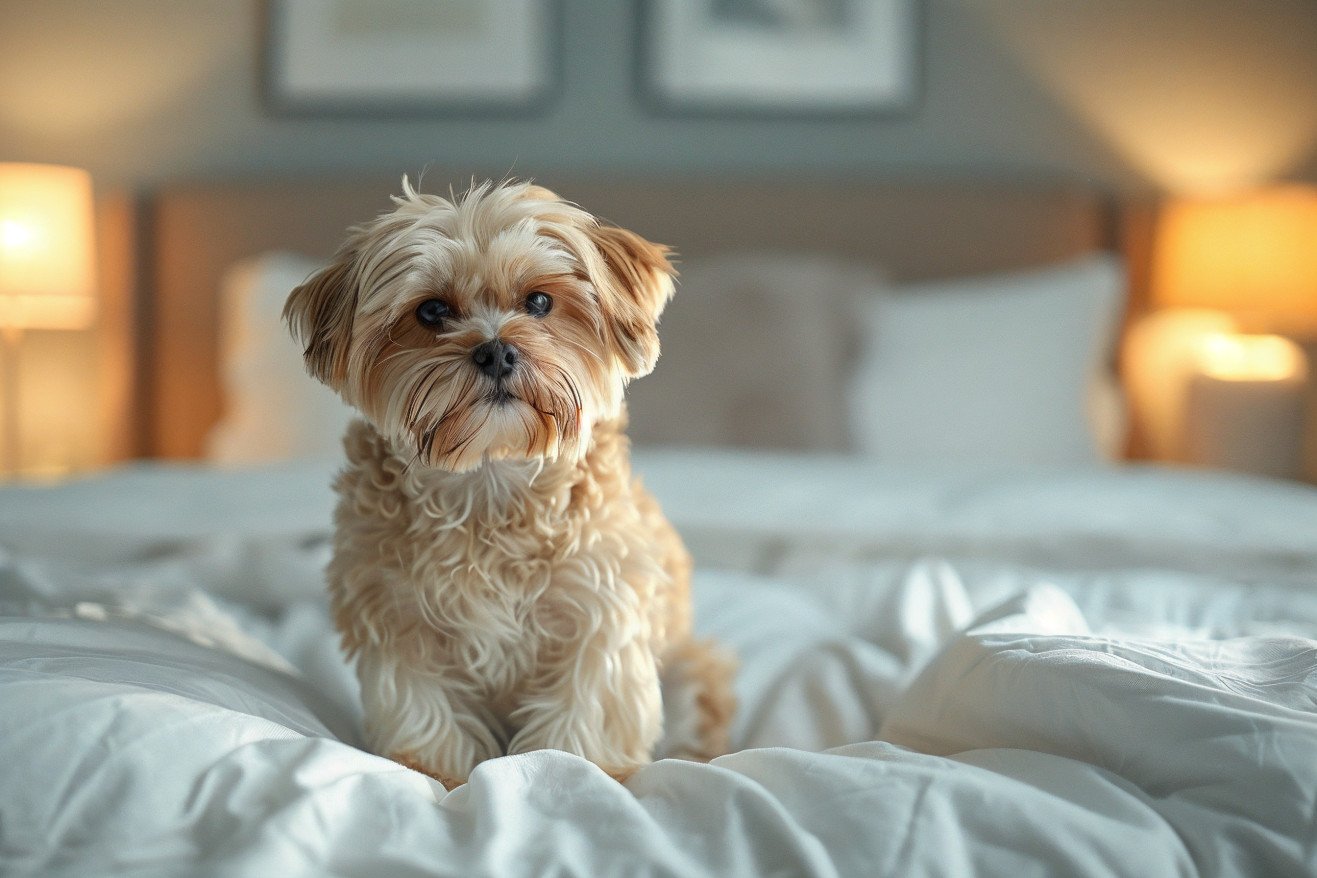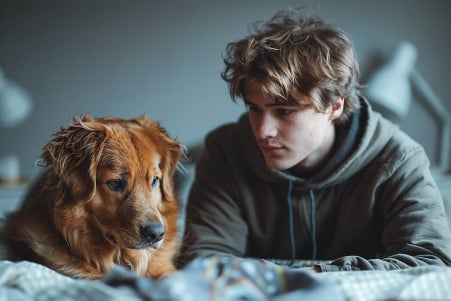Why Did My Dog Poop on My Bed? Understanding Canine Behavior
14 June 2024 • Updated 13 June 2024

If you've ever walked in on your dog after they've pooped on your bed, you know it's not a fun experience. There are many reasons why dogs poop on beds, ranging from medical conditions like inflammatory bowel disease to behavioral issues like separation anxiety. However, in general, it's a sign that something is wrong, whether that's a health problem or a reaction to something in their environment.
In this article, we'll take a deep dive into the science behind this messy problem, drawing on research from the fields of animal behavior, biology, and veterinary medicine. By learning more about the causes of this unwanted behavior, you can not only put your mind at ease but also learn how to better deal with the problem and improve your relationship with your dog.
Why did my dog poop on my bed?
Determining the Root Causes: Medical Conditions and Behavioral Issues
There are many reasons why a dog might poop on a bed, and many of them are related to medical and behavioral issues. For example, common medical problems like inflammatory bowel disease, parasites, viruses, and food intolerances can cause gastrointestinal distress, which can lead to accidents in the house. In addition, as dogs get older, they may develop fecal incontinence due to muscle weakness or cognitive dysfunction similar to dementia, which can lead to them forgetting their house training.
Behavioral causes are also very common. For example, dogs that experience separation anxiety when they're alone may act out by pooping in the house. Dogs may also have noise phobias or other issues with the environment that make them reluctant to go to the bathroom outside. Even changes in their schedule or distractions during walks can lead to a dog not pooping when they're supposed to.
It's important to first rule out medical issues by talking to a vet. Potential underlying issues include increased urination, gastrointestinal disease, infections, or neurological problems. Once any medical issues have been addressed, you can move on to behavioral modification. No matter what, it's important to figure out the root cause, whether it's medical or psychological, to make sure that this issue is resolved and that there aren't any lasting odors or stains.
How to Clean and Remove Odor
Cleaning and removing dog poop from bedding, mattresses, and other surfaces as soon as possible is important to avoid stains and odors. Amerisleep says the first step is to remove any solid waste by using disposable gloves and paper towels.
When it comes to the mattress, enzyme cleaners and hydrogen peroxide solutions are the best options for breaking down organic matter and getting rid of odors. The Dogington Post also says to stay away from bleach, as it can ruin the mattress. Baking soda and white vinegar can be used to help remove any remaining odors.
WikiHow recommends soaking up as much of the mess as possible, applying a vinegar solution, and letting the mattress dry for up to 24 hours. To avoid future accidents and make cleanup easier, consider using a waterproof mattress protector.
With these tips for cleaning and removing odors, pet parents can take care of the mess and make sure their dogs don't go back to the same area.
Training Techniques and Methods That Work
Training techniques that are both consistent and positive are the most effective way to prevent and correct the behavior of dogs pooping on the bed. According to American Humane, it is important to never rub a dog's nose in urine or feces, or discipline them for an "accident", as this will only lead to the dog fearing and hiding from you.
Creating a schedule for feeding, walking, and bathroom breaks can help ensure that the dog is able to go when they need to. The Dogington Post also suggests crate training and using piddle pads or litter boxes for dogs that can't be left alone, and then gradually moving them to an outdoor bathroom.
If separation anxiety is the cause, Pets Best recommends counterconditioning and desensitization. This will help ensure that the dog doesn't have an accident when the owner is away. It's important to remember that patience and the absence of discipline are important throughout the process, as discipline can make the issue worse and harm the relationship between the dog and the owner.
Separation Anxiety
Separation anxiety is a common cause of dogs pooping on beds or other inappropriate places. Wag! explains that separation anxiety is a condition in which a dog feels distress when separated from its owner, which can result in defecation, urination, barking, and other destructive behaviors.
To help dogs with separation anxiety, Pets Best says that pet parents can provide interactive toys, puzzle feeders, or calming supplements that will keep the dog occupied and calm. Pet parents can also work to build their dog's confidence by gradually increasing the amount of time they spend alone and using positive reinforcement.
Give A Shit recommends that pet parents prevent dogs from pooping on the bed by restricting access to certain areas of the home, like the bedroom, when the dog is alone. In addition, they say that making sure dogs get enough exercise, mental stimulation, and that they have a safe, comfortable place to live can help reduce stress and anxiety when dogs are alone.
By treating the root causes of this behavior and making sure that their dogs have what they need to feel safe and secure, pet parents can keep their dogs from pooping on the bed or in other inappropriate places when they're alone.
Dealing With the Emotional Toll and Frustration
For pet parents, discovering dog poop on the bed can be a source of frustration and emotional stress. Yet, it’s important to remember that this is often a sign of an underlying issue and not a direct act of defiance. Wildflower Dog Treats explains that dogs can engage in inappropriate elimination due to stress, separation anxiety, or changes in their living situation.
To help deal with the emotional toll, VCA Animal Hospitals says that pet parents should take a calm and understanding approach, as punishing the dog can make the situation worse and harm the bond between the pet and their owner. It’s also important to be patient, talk to other pet parents, and even work with a professional trainer or behaviorist.
GoodRx stresses that pet parents should never discipline or punish their dog for pooping in the house, as this won’t solve the root cause. Instead, they should focus on building a stronger relationship with their dog and celebrating the small victories that come with training and behavior modification.
Conclusion: Strengthening the Human-Animal Bond
WebMD notes that even the most well-trained dog may have accidents in the house from time to time. There are many reasons for this, including medical, aging, and emotional issues.
Medical problems such as inflammatory bowel disease, parasites, and food sensitivities can cause gastrointestinal distress and the need to defecate more frequently. Aging can lead to fecal incontinence or cognitive dysfunction that makes it harder for dogs to control their bowels. Emotional issues such as separation anxiety and noise phobias can also contribute to the problem.
PetMD explains that the first step in dealing with the issue is to make sure there are no medical problems by taking the dog to the vet. Once medical problems are ruled out, behavioral modification can be used to help the dog. This can include things like creating a consistent schedule, using crate training, and desensitizing the dog to the things that cause them stress.
VCA Animal Hospitals points out that it's important to avoid punishment because it can make the problem worse and damage the relationship between the dog and the owner. Instead, a calm, patient, and understanding approach is the best way to resolve the issue and strengthen the bond between the dog and the owner.
By addressing the issues that are leading to the problem, pet parents can look forward to a future with fewer accidents and more positive experiences with their dogs.


